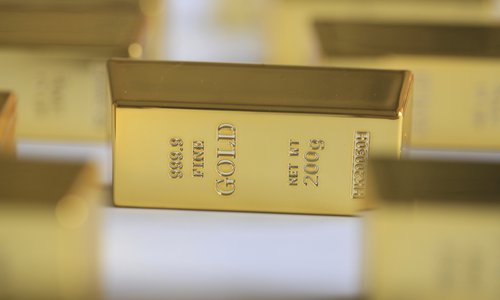HOME >> BUSINESS
Deepening mutual trust higher on the agenda for China and Russia than buying gold
By By Gao Fei and Xu Guoying Source:Global Times Published: 2019/10/4 11:37:16

File photo: VCG
According to data from the Central Bank of the Russian Federation, Russia's foreign exchange reserves reached a record high of $529.1 billion in August. Gold reserves were 2219.2 metric tons, or $109.5 billion, accounting for 20.7 percent of total foreign exchange reserves. It is the first time in 30 years that the share of gold in Russian foreign exchange reserves has exceeded 20 percent.
Russia's central bank is increasing its gold reserves and has been the world's largest buyer of gold for years. In the last 10 years, Russia's gold reserves have more than tripled. There are reasons why Russia has significantly increased its gold reserves.
First, it's a way to avoid international economic risks. Gold has high liquidity and scarcity; it can be traded as a commodity, used as currency and invested as an asset. Holding gold can help a country establish safe mechanisms to enhance its ability to withstand international financial risks.
Since the global financial crisis of 2008, the role of the US dollar as a global currency has been increasingly questioned. Buying gold has become an effective way to hedge against the greenback and enrich investment. Russia apparently expects to avoid the risk of dollar volatility and maintain assets value by diversifying its foreign exchange reserves. In the past 20 years, the annual rate of return of the entire commodity market is only about 1 percent, while that of gold approaches 8 percent. Russia has certainly made a fortune.
Second, buying gold can promote Russia's power in political competition. Since 2008, relations between Russia and the West have deteriorated, geopolitical relations have become increasingly tense, and economic cooperation has suffered setbacks. Western sanctions, volatile oil prices and the devaluation of the ruble have accelerated Russia's de-dollarization pace by selling US bonds and replacing them with gold. According to data released by the US Treasury, Russia dropped out of the list of 30 top US bondholders in May 2018 and has continued reducing the US bonds holding. By abandoning the US dollar, the central bank of Russia intends to use gold to diversify its foreign exchange reserves, and to establish a new financial system independent of the US dollar that can stabilize the domestic economy and respond to external challenges.
Third, Russia can better respond to changes in the international order with more gold. The current international order and relations among countries are undergoing major changes and adjustments, and the world is facing prominent instability and uncertainty. Gold has thus returned as a safe haven. As a long-established major world power, Russia has greatly increased the proportion of gold reserves, which reflects its concern about future changes in the world. In addition, escalating China-US trade frictions add uncertainty to the world economy. Under expectations of a global economic recession, the purchase of gold can be seen as a bet made by Russia on the future.
Compared with Russia, China's gold reserves have not surged. Although China's total reserves have reached 1,942.4 tons, its gold reserves only account for 2.7 percent of its foreign exchange reserves.
From China's perspective, gold reserves are a vital part of international reserves and an important factor to diversify investment portfolios, but they are not the only substitutes for foreign exchange reserves. Nevertheless, since the price of gold assets is doing well, it does not rule out the possibility that China may follow Russia to increase gold reserves.
The current world trade situation remains tense with the shadow of a "currency war" hanging over it. Central banks worldwide have increased their holdings of gold to evade risks. However, it is not gold, but trust and cooperation among countries that the world lacks. For China and Russia, improving mutual trust and deepening cooperation is more important than buying gold.
In September, China and Russia emphasized promoting cooperation of gold market participants between the two countries while Chinese Premier Li Keqiang paid an official visit to Moscow.
Deepening mutual trust and cooperation between Russia and China can be seen as investing in each other. The China-Russia comprehensive strategic partnership of coordination for a new era is becoming a model of new-type relations between major countries, which is even more stable and valuable than gold.
Gao Fei is a professor at China Foreign Affairs University. Xu Guoying is a doctoral student at China Foreign Affairs University. bizopinion@globaltimes.com.cn
Posted in: EYE ON ECONOMY,BIZ FOCUS